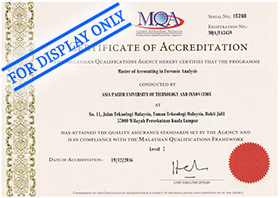You are here
Master of Accounting in Forensic Analysis

| |||||
APU-DMU DUAL DEGREE PROGRAMME
| |||||
MORE THAN JUST AN ACCOUNTING MASTER PROGRAMME
ADMISSION REQUIREMENTS
| GENERAL REQUIREMENTS | |
• Bachelor’s degree in related fields with a minimum CGPA of 2.75, or its equivalent qualification as accepted by the Senate. | |
Note: The above entry requirements may differ for specific programmes based on the latest programme standards published by Malaysian Qualifications Agency (MQA).
| ENGLISH REQUIREMENTS | |
INTERNATIONAL STUDENTS | • IELTS : 5.5 |
PROGRAMME OUTLINE
This programme is specifically designed to provide:
- A progressive, challenging and stimulating framework of study that will equip students with knowledge and skills required in this field.
- Legal and ethical knowledge for forensic accountants to meet the demands of the current financial market.
- FinTech knowledge and technical skill relevant to Accounting and Finance.
THE BENEFITS OF THE PROGRAMME |
On successful completion of this programme, you will be able to :
- Demonstrate an advanced understanding of the concepts, principles of forensic accounting theory, and understand the legal framework of forensic accounting services and the roles and responsibilities of the forensic accountant.
- Recognise and appropriately respond to ethical issues in the practice of accounting by incorporating appropriate professional codes of conduct and social responsibility.
- Conduct successful investigations and communicate effectively in writing and orally both in and out of the courtroom with respect to a variety of criminal and civil financial matters.
- Develop a mindset of professional scepticism, using critical thinking and creative approaches to complex problem solving.
- Gather and analyse quantitative and nonquantitative evidence, plan and conduct a research project in a professional and ethical manner which requires familiarity with a range of data, research sources and appropriate methodologies.
- Create, evaluate and assess a range of options together with developing the capacity to apply ideas and knowledge to a range of situations.
WHO SHOULD ATTEND |
This progamme is ideal for any fresh graduate interested in pursuing a career in the dynamic and growing field of forensic accounting and fraud examination as well as those accountants and auditors who wish to pursue or enhance their career as forensic accountants. This programme integrates the accounting, auditing and investigative skills used to yield analysis and results suitable for use by the courts as the basis for resolution.
MODULES & PROJECT |
This programme comprises 13 coursework modules (including Research Methodology module) and a Project.
PRE-REQUISITE MODULES (FOR NON-ACCOUNTING STUDENTS) | |
|
|
MODULES | |
|
|
PROJECT |
You will be expected to engage in comprehensive research through a critical review of published material relevant to Accounting in Forensic Analysis. Thorough review is carried out on theoretical and empirical literature from which a conceptual or theoretical framework is derived. Sources of literature will range from academic papers, business case history and consultancy reports. Existing theories and research findings will be utilised to create solutions or opportunities to address challenges in today’s international business climate. Identification of such opportunities or challenges will be important factors in modern business strategies and planning. Business case history will be utilised to research and analyse either the strategies of an organisation or the application of specific concepts, theories or techniques as well as analyse the effectiveness and outcomes. The consultancy reports will be utilised to examine contemporary problems faced by one or more organisations and to recommend strategies and actions to be taken by the organisation(s). Case study would be the core focal point of content delivery for this course.
CAREER OPTIONS
|
|
COURSE FEES
Malaysian Students | International Students |
RM 34,800 | RM 38,800 (USD 9,700) |
* Fees stated above do not include Enrolment Fees, Registration Fees and other Miscellaneous Fees. Please refer to Fee Guide for details.
MQA ACCREDITATION
(R2/0411/7/0007)(04/29)(MQA/FA3459) |
| All information is correct at the time of publication, but is subject to change in the interest of continuing improvement. |
Master of Accounting & Finance Programmes |




